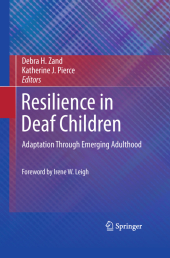 Neuerscheinungen 2014Stand: 2020-02-01 |
Schnellsuche
ISBN/Stichwort/Autor
|
Herderstraße 10
10625 Berlin
Tel.: 030 315 714 16
Fax 030 315 714 14
info@buchspektrum.de |

Katherine J. Pierce, Debra H. Zand
(Beteiligte)
Resilience in Deaf Children
Adaptation Through Emerging Adulthood
Herausgegeben von Zand, Debra H.; Pierce, Katherine J.
2011. 2014. xxi, 396 S. 235 mm
Verlag/Jahr: SPRINGER, BERLIN; SPRINGER NEW YORK; SPRINGER 2014
ISBN: 1-489-99164-6 (1489991646)
Neue ISBN: 978-1-489-99164-5 (9781489991645)
Preis und Lieferzeit: Bitte klicken
Resilience in Deaf Children emphasizes not only the capability of deaf individuals to withstand adversity, but also their positive adaptation through interactions. The text discusses attachment, self-concept, and social competence, which are crucial to the development of all young people.
Historically, the diagnosis of deafness in a child has been closely associated with profound disability, including such typical outcomes as unmet potential and a life of isolation. A major shift away from this negative view has led to improved prospects for deaf children.
Resilience in Deaf Children emphasizes not only the capability of deaf individuals to withstand adversity, but also their positive adaptation through interactions with parents, peers, school, and community. In this engaging volume, leading researchers and professionals pay particular attention to such issues as attachment, self-concept, and social competence, which are crucial to the development of all young people. In addition, the volume offers strategies for family members, professionals, and others for promoting the well-being of deaf children and youth.
Coverage includes:
Attachment formation among deaf infants and their primary caregivers.
Deaf parents as sources of positive development and resilience for deaf infants.
Enhancing resilience to mental health disorders in deaf school children.
Strength-based guidelines for improving the developmental environments of deaf children and youth.
Community cultural wealth and deaf adolescents´ resilience.
Self-efficacy in the management of anticipated work-family conflict as a resilience factor among young deaf adults.
Resilience in Deaf Children is essential reading for researchers, clinicians, and graduate students in clinical child, school, and developmental psychology as well as for allied researchers and professionals in such disciplines as school counseling, occupational therapy, and social work.
Dedication.- Foreword.- Acknowledgements.- Introduction.- Chapter 1. Critical Issues in the Application of Resilience Frameworks to the Experiences of Deaf Children and Young People.- Infancy & Toddlerhood.- Chapter 2. Attachment Formation Among Deaf Infants and their Primary Caregivers: Is Being Deaf a Risk Factor for Insecure Attachment?.- Chapter 3. Deaf Parents as Sources of Positive Development and Resilience for Deaf Infants.- Chapter 4. Risk and Resiliency of Infants/Toddlers who are Deaf: Assessment and Intervention Issues.- Childhood.- Chapter 5. Developing a Concept of Self and Other: Risk and Protective Factors.- Chapter 6. Risk and Resilience for Social Competence: Deaf Students in General Education Classrooms.- Chapter 7. Enhancing Resilience to Mental Health Disorders in Deaf School Children.- Chapter 8. Promoting Resilience: Suggestions for Families, Professionals and Students.- Adolescence.- Chapter 9. Whose Literacy Is It, Anyway? Strengths Based Guidelines for Transforming the Developmental Environments of Deaf Children and Adolescents.- Chapter 10. Building Resilience in Adolescence: The Influences of Individual, Family, School and Community Perspectives and Practices.- Chapter 11. Community Cultural Wealth and Deaf Adolescents´ Resilience.- Chapter 12. Promoting Resilience in Deaf Adolescents.- Emerging Adulthood.- Chapter 13. Self-Efficacy in the Management of Anticipated Work-Family Conflict as a Resilience Factor Among Young Deaf.- Chapter 14. Psychological Well-Being in Emerging Adults who are Deaf.- Chapter 15. Resiliency and the Emerging Deaf Adult.- Epilogue.


